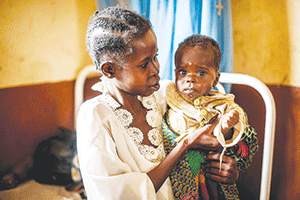Nigerian children are among the most abused and confused in the world, reports Special Correspondent SAM NWOKORO.
This is one agenda the Muhammadu Buhari administration has to tackle seriously. The Nigerian child faces enormous growth challenges. The future seems bleak unless governments at all levels establish effective social structures that guarantee the safety and make life less hazardous.
 Nigerian children face problems that are both man made and natural, which legislations and advocacy campaigns have not ameliorated due to a lack of commitment in enforcement and weak institutions.
Nigerian children face problems that are both man made and natural, which legislations and advocacy campaigns have not ameliorated due to a lack of commitment in enforcement and weak institutions.
The problems include child slavery, trafficking, trauma of violence, displacement from home in the North East due to terrorism, disruption in education because of communal strife or school closure caused by teachers’ strike.
United Nations Children’s Fund (UNICEF) estimates that over 769,000 children in Nigeria are out of school.
An Education for All Global Monitoring report by United Nations Educational, Scientific and Cultural Organisation (UNESCO) said Nigeria holds the world record for the number of out of school children.
Of the 10.5 million children out of school worldwide in 2013, Nigeria accounted for 4.9 million or 47 per cent, doing worse than Pakistan (1.5 million), Ethiopia (2.4 million), India (2.3 million), and Philippines (1.5 million).
Nigerian children also contend with distorted perception of life due to ethno-religious and cultural configurations, usurping parental roles as family breadwinners, high risk exposure to urban environmental nuisances and epidemics, and poor nutrition.
Sunday Ahmed, a resident of Lagos who sells pharmaceutical products, said: “I spend my monthly income on paying charges like electricity bills, sanitation bills, security levies in my neighborhood, waste disposal tariff, rent of N7,000 for my two bedroom apartment, and another N8,000 for my shop.
“Add other sundry levies from children’s school, because they are in private school, how much do I have left, and business is slow. You don’t even talk about the money I spend every day in my shop to buy fuel for my generator. Then how much do I have left?”
Many faces of child abuse
Age old practices hold the Nigeria child captive in spite of advances in science and technology.
Female genital mutilation is still practised in many parts of the country, according UNICEF 2015 State of the World’s Children Report.
There is inadequate funding of free education which many state governments implement. In a particular state in the South East, there is complaint that free education is only a public relations stunt.
Other problems include rape, domestic violence, early marriage, and kidnapping.
In the North, out of school and the Almajiri (beggar) syndrome remain a tar in the face of Nigeria.
Government deregulation has increased urbanisation and a growing population of street children. Many children join every year the rank of suicide bombers wagging jihad in the North.
Urban homelessness and ghetto living are prevalent in the North and South. Environmental pollution in the Niger Delta endangers the lives of children.
Efforts by advocacy groups and law enforcement agencies to prosecute child abuse cases are rendered ineffective by the rigmarole in the legal system, hence abused children do not run to the courts and other protective institutions for redress.
Child education threatened
UNICEF warned that one of the factors threatening children education in Nigeria but which authorities do not take seriously is early child marriage.
Child’s Right Agenda (CRA), a non governmental organisation (NGO) based in Abuja, added in its 2015 report that “this is one of things threatening the education of our children.
Unfortunately not much information is available to the authorities on how deep this otherwise unpopular culture has become commonplace these days, even in most states in Southern Nigeria where this practice was scanty previously.
“We used to know it as part of Islamic tradition. But it is no longer restricted to Islamic areas in the country. It has become fashionable for parents, in order to cope with life, to marry off their daughters as early as 13, 14, 15 years of age, even if it means taking them out of school.”
CRA lamented that there is no official figure or legal penance for this type of child abuse.
“Another challenge in Nigeria is the issue of girl’s education. In the North particularly, the gender gap remains wide and the proportion of girls to boys in school ranges from one girl to two boys to one to three in some states,” UNICEF report on Nigerian child education challenges in 2015 said.
“Many children do not attend school because their labour is needed to either help at home or bring additional increase into the family. Many families cannot afford the associated cost of sending their children to school such as uniforms and text books.
“To others, the distance to the nearest school is a major hindrance. Another cause of low enrolment, especially in the North, is cultural bias. Most parents do not send their children, especially girls, to school and prefer to send them to Qur’anic schools rather than formal schools.
“Children under 15 years account for about 45 per cent of Nigeria’s estimated 187 million people. Forty per cent (40 per cent) of Nigerian children aged 6-11 do not attend any primary school, with the Northern region recording the lowest school attendance rate in the country, particularly for girls.
“Despite a significant increase in enrolment rate in recent years, it is estimated that about 4.7 million children of primary school age are not in school.
“Even when children are in school, many do not complete the primary cycle. According to current data, 3 per cent of pupils drop out of primary school and only 54 per cent transit to JSS (Junior Secondary School).
“Reasons for this low completion rate include child labour, economic hardship and early marriage for girls.
“A majority of primary schools, especially in the rural areas, lack water, electricity and toilet facilities. For example, on average, only one toilet is available for 600 pupils in the primary school system despite political commitments to try to reverse years of neglect in the educational sector.”
Homelessness
Pat Edewor, a Nigerian-born international researcher writing in the Mediterranean Journal of Social Sciences published by Mediterranean Centre of Social and Educational Research, an international think thank in Geneva, said in 2014 that in the past 10 years, polygamy in Nigeria has accentuated following a surge in spending between 2000 up to 2010.
This, he argued, affected social habits and increased social indulgences.
“Over this period there was an increase in broken homes arising from matrimonial infidelity. This threw many children out of homes,” he wrote.
Edewor also cited parental neglect, poverty, peer influence, and anti-social vices, among other factors.
For Nigerian children, this has meant a dislocated view of life as witnessed in the resurgence of a crimes such as robbery, rape, carjacking, and all forms juvenile delinquency.
It was only in 2003 the Nigerian government started taking the issue of the child into national developmental calculus, beginning with the Child Rights Act but which implementation has no measurable impact in redressing decades-long neglect of children.
Homeless children in Nigeria are exposed to rape, kidnaping, drug trafficking, and servitude. Most often they are sold by abductors.
Domestic violence/servitude
Perhaps more than any other form of child abuse is the use of the children for exploitative labour in and outside the country.
“Child labour remains a major source of concern in Nigeria,” the International Labor Organisation (ILO) reported earlier this year.
ILO defines child labour as “work that is mentally, physically, socially or morally dangerous and harmful to children and deprives them of opportunities for schooling and development.”
It estimates at 15 million, the number of working children under the age of 14 in Nigeria.
“The high level of diverse and tedious jobs that children execute in dangerous circumstances is particularly worrying. These jobs include being street vendors, beggars, car washers and shoe shiners,” ILO said.
“Others work as apprentice mechanic, hair dressers and bus conductors while a large number work as domestic servants. Girls are working at earlier ages than boys, particularly in the rural areas.
“They also suffer the triple burden of housework, school work, and work-out-of home whether paid or unpaid. One of the most common practices is the use of children as child domestics, especially girls.
“Major causes of child labour are widespread poverty, rapid urbanisation, and breakdown of extended family affiliations, high school drop-out rates, and lack of enforcement of legal instruments meant to protect children.
“Traditionally, children have worked for their families. But today, children are forced to work for their own and family survival. Money made by child’s family members becomes a significant part of poor families’ income.
“These children who work, suffer from fatigue, irregular attendance at school, lack of comprehension and motivation, improper socialisation, exposure to risks of sexual abuse and high likelihood of being involved in crime,” ILO lamented.














